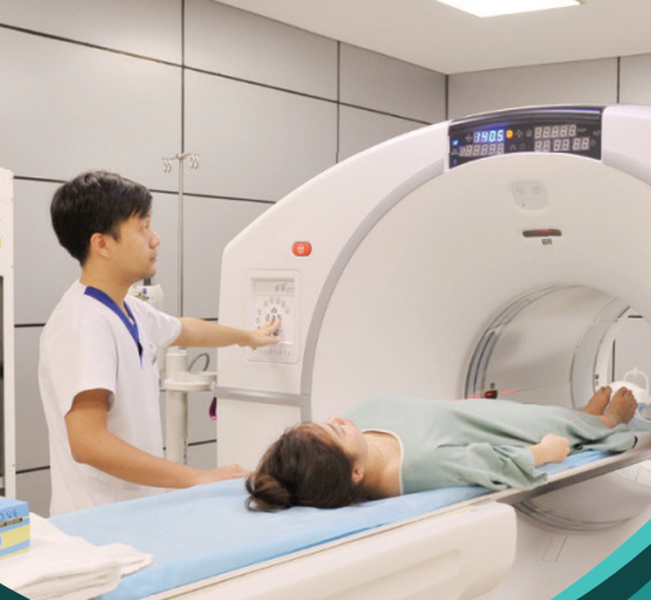Learn about rectal-anal-vaginal fistulas
Rectal-vaginal fistula and anal-vaginal fistula are two rare diseases that greatly affect the quality of life of patients. Therefore, when encountering these two conditions, patients should soon choose appropriate treatment methods.
1. What is rectal - anal - vaginal fistula?
A rectal-vaginal fistula is a congenital or acquired communication between the two mucosal tubes of the rectum (large intestine) and the vagina. An anal-vaginal fistula is a fistula between the anal canal distal to the dentate line and the vagina. Substances present in the intestines can leak through fistulas.
2. Causes of rectal - anal - vaginal fistula
Natural; Obstetric trauma: Prolonged labor, obstetric procedures (forceps, suction, episiotomy,...). The disease is common in underdeveloped countries because the prolonged labor process makes the case of necrosis due to compression increase. In addition, the disease is also seen after surgery with grade 3 and 4 tears due to injuries during vaginal delivery and infection after episiotomy, leading to fistula formation; After a difficult hysterectomy, surgery involving the posterior vaginal wall, perineum, anus, and rectum; Intestinal infections such as Crohn's disease, ulcerative colitis also cause rectal-vaginal fistula in women; Due to diverticulitis colon , colon cancer , vaginal cancer ; cancer of the cervix, rectum, uterus and anus; intestinal tuberculosis, stool clamp, venereal disease; Complications of surgery in the treatment of pelvic organ prolapse using grafts inserted through the vagina or perineum; Consequences of pelvic radiotherapy and after radiation therapy for 6-24 months; HIV infection, sexual abuse.

Viêm loét đại tràng gây rò trực tràng - âm đạo
3. Symptoms of rectal - anal - vaginal fistula
Depending on the location and size of the rectal, anal, and vaginal fistula, patients may have mild or severe symptoms related to urination and hygiene. Symptoms of vaginal fistula include:
Gas, stool or pus discharge from the vagina; Vaginal odor; Recurrent vaginal or urinary tract infections; Irritation or pain in the vagina, vulva, or the area between the vagina and anus (perineum); Pain during sex.
Gas, stool or pus discharge from the vagina; Vaginal odor; Recurrent vaginal or urinary tract infections; Irritation or pain in the vagina, vulva, or the area between the vagina and anus (perineum); Pain during sex.
4. Diagnosis of rectal - anal - vaginal fistula
When there are symptoms of vaginal - rectal - anal fistula, the patient should see a doctor as soon as possible. A fistula can be the first sign of more serious problems like an abscess or cancer. Methods of diagnosing an anorectal fistula include:
Clinical examination: The doctor examines the vagina, anus and perineum with gloves. In addition, the doctor can use a speculum inserted into the vagina to expand and then use a straight colostoscope to clearly see the anus, rectum, observe the fistula more easily; Methylene enema: Put a white gauze into the vagina, inject methylene blue into the rectum, withdraw the gauze after about 15-20 minutes, if the gauze is blue, it indicates a vaginal-rectal fistula; Ultrasound: An anorectal or transvaginal ultrasound using sound waves to create pictures of the inside of the pelvis; Barium enema: Inserting contrast material into the rectum, the doctor will see the fistula on the X-ray film; Computed tomography (CT) scan: Uses powerful X-rays to show detailed pictures of the inside of the pelvis; Magnetic resonance imaging (MRI): Uses a strong magnetic field and radio waves to show pictures of the inside of the pelvis. This method can give the doctor a clear view of the fistula or other problems such as a tumor in the rectum - anus, ...
Clinical examination: The doctor examines the vagina, anus and perineum with gloves. In addition, the doctor can use a speculum inserted into the vagina to expand and then use a straight colostoscope to clearly see the anus, rectum, observe the fistula more easily; Methylene enema: Put a white gauze into the vagina, inject methylene blue into the rectum, withdraw the gauze after about 15-20 minutes, if the gauze is blue, it indicates a vaginal-rectal fistula; Ultrasound: An anorectal or transvaginal ultrasound using sound waves to create pictures of the inside of the pelvis; Barium enema: Inserting contrast material into the rectum, the doctor will see the fistula on the X-ray film; Computed tomography (CT) scan: Uses powerful X-rays to show detailed pictures of the inside of the pelvis; Magnetic resonance imaging (MRI): Uses a strong magnetic field and radio waves to show pictures of the inside of the pelvis. This method can give the doctor a clear view of the fistula or other problems such as a tumor in the rectum - anus, ...

Chụp cắt lớp vi tính (CT)
5. Treatment of rectal - anal - vaginal fistula
Many studies show that about 50% of cases of anal-vaginal fistula due to obstetric complications can heal on their own within 6 months. Removing the foreign body in the fistula will help the fistula heal on its own. Cases of rectal-anal-vaginal fistulas caused by inflammation and radiation therapy are difficult to heal on their own despite aggressive medical treatment. For pelvic infections, the abscess needs to be drained, taken with antibiotics, anti-inflammatory and after about 1 month it will heal on its own.
Cases of vaginal fistula due to cancer must have surgery to completely solve the tumor because if only the fistula is treated, this phenomenon still has a risk of recurrence in the future.
For cases of rectal-anal-vaginal fistula, medical treatment does not achieve the desired effect, surgical treatment is required. However, surgery is contraindicated in cases of intestinal, vaginal, anal infections, etc. Patients need to thoroughly treat the infection before surgery to close the fistula. At the same time, people with serious systemic diseases such as heart failure, lung disease, ... are also not indicated for surgery.
In the case of a high rectal-vaginal fistula (a few centimeters above the dentate line, in the proximal rectus) surgery is required through the abdomen and a partial rectal resection is required. Rectal-vaginal fistulas and most anal-vaginal fistulas can be operated through the vagina, perineum, rectum, or through the sacrum. During surgery, the doctor will remove a piece of tissue from another place in the body to plug the fistula. At the same time, the surgeon can also treat the anal sphincter if there is a problem.
Some patients need a colectomy. This procedure creates an opening called a stoma through the abdominal wall. The last segment of the colon is protruded into a slit with a waste bag until the fistula has completely healed.
After surgery, the patient can appear the same day or follow up for a few days depending on the specific case. Some possible risks after surgery to close the rectal-anal-vaginal fistula include: bleeding; infection; damage to the bladder, ureters, or intestines; blood clots in the legs or lungs; blockage in the intestines; scar.
Cases of vaginal fistula due to cancer must have surgery to completely solve the tumor because if only the fistula is treated, this phenomenon still has a risk of recurrence in the future.
For cases of rectal-anal-vaginal fistula, medical treatment does not achieve the desired effect, surgical treatment is required. However, surgery is contraindicated in cases of intestinal, vaginal, anal infections, etc. Patients need to thoroughly treat the infection before surgery to close the fistula. At the same time, people with serious systemic diseases such as heart failure, lung disease, ... are also not indicated for surgery.
In the case of a high rectal-vaginal fistula (a few centimeters above the dentate line, in the proximal rectus) surgery is required through the abdomen and a partial rectal resection is required. Rectal-vaginal fistulas and most anal-vaginal fistulas can be operated through the vagina, perineum, rectum, or through the sacrum. During surgery, the doctor will remove a piece of tissue from another place in the body to plug the fistula. At the same time, the surgeon can also treat the anal sphincter if there is a problem.
Some patients need a colectomy. This procedure creates an opening called a stoma through the abdominal wall. The last segment of the colon is protruded into a slit with a waste bag until the fistula has completely healed.
After surgery, the patient can appear the same day or follow up for a few days depending on the specific case. Some possible risks after surgery to close the rectal-anal-vaginal fistula include: bleeding; infection; damage to the bladder, ureters, or intestines; blood clots in the legs or lungs; blockage in the intestines; scar.
6. Proper health care for rectal - anal - vaginal fistula
Gently clean the external genitalia with warm water whenever there is vaginal discharge or stool; Avoid using cleaning solutions that have drying and irritating ingredients. Use mild, unscented soaps; Avoid deep douching as this can increase the risk of infection; After cleaning the external genitalia should dry with a clean towel; Use only paper towels, wipes that are moistened, odorless and alcohol-free for vaginal - anal hygiene; Consult your doctor about the use of creams or powders that protect the skin from irritation by vaginal secretions or feces; Wear cotton underwear and loose-fitting clothes; Change dirty underwear constantly; Absorbent pads, disposable pads, or adult diapers may be used if fluid or stool is present. Rectal-anal-vaginal fistulae seriously affect the patient's normal activities. Not only that, this is also a warning sign of many dangerous diseases. Therefore, when there are symptoms of the disease, it is best for the patient to go to the doctor for an accurate diagnosis, timely and effective treatment.
Patients with rectal - anal - vaginal fistulas can go to Vinmec International General Hospital for examination and treatment. There is a team of well-trained, professional and experienced gynecologists; system of modern equipment, meeting international standards; professional service quality, bringing satisfaction and comfort to customers.
Patients with rectal - anal - vaginal fistulas can go to Vinmec International General Hospital for examination and treatment. There is a team of well-trained, professional and experienced gynecologists; system of modern equipment, meeting international standards; professional service quality, bringing satisfaction and comfort to customers.
Để đặt lịch khám tại viện, Quý khách vui lòng bấm số HOTLINE hoặc đặt lịch trực tiếp TẠI ĐÂY. Tải và đặt lịch khám tự động trên ứng dụng MyVinmec để quản lý, theo dõi lịch và đặt hẹn mọi lúc mọi nơi ngay trên ứng dụng.
Bài viết này được viết cho người đọc tại Sài Gòn, Hà Nội, Hồ Chí Minh, Phú Quốc, Nha Trang, Hạ Long, Hải Phòng, Đà Nẵng.




